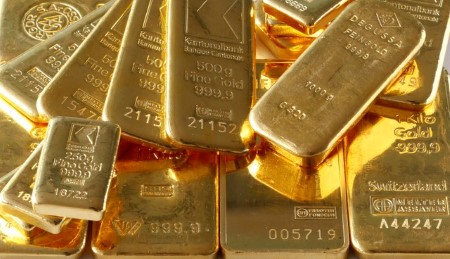




Philippines Trade Update: Imports weaken on tepid demand
 DOWNLOAD
DOWNLOAD

Policy Rate Updates: BSP outlook — cloudy with a chance of rate cut
 DOWNLOAD
DOWNLOAD

January Economic Update: Growth slows, prices rise
 DOWNLOAD
DOWNLOAD


Gold falls to three-week low on robust dollar, Fed rate-hike fears

Aug 19 (Reuters) – Gold prices slipped to a three-week low on Friday and were set for their first weekly drop in five, as a stronger dollar and prospects of more rate hikes by the US Federal Reserve dented bullion’s appeal.
Spot gold was down 0.2% at USD 1,753.97 per ounce, as of 0706 GMT, after falling to its lowest since July 28 at USD 1,751.01 earlier in the session. For the week, bullion was down 2.6%.
US gold futures eased 0.1% to USD 1,768.90.
“Markets are expecting interest rates to go further up and of course the strong dollar is definitely weighing on gold prices at the moment,” said Brian Lan, managing director at dealer GoldSilver Central.
“Many are staying on the sidelines expecting gold prices to go further down. Also, we’ve seen quite a bit of liquidation on the ETF (exchange-traded fund) side.”
The dollar surged to a one-month high against its rivals, making gold more expensive for buyers holding other currencies.
The Fed needs to keep raising borrowing costs to bring high inflation under control, several US central bank officials said on Thursday.
St. Louis Fed President James Bullard said he was currently leaning toward supporting a third straight 75-basis-point rate hike in September.
Gold is highly sensitive to rising US interest rates, as they increase the opportunity cost of holding non-yielding bullion.
In the July meeting minutes released on Wednesday, Fed officials said the pace of future rate hikes would depend on incoming economic data.
Data on Thursday showed the number of Americans filing new claims for unemployment benefits fell last week, suggesting labour market conditions remain tight.
On the technical front, spot gold may fall to USD 1,744 per ounce, as it has broken a support at USD 1,759, according to Reuters analyst Wang Tao.
Spot silver fell 0.9% to USD 19.34 per ounce and was on track for its biggest weekly percentage fall since late-January.
Platinum fell 0.4% to USD 906.96 per ounce and palladium slipped 0.6% to USD 2,142.47.
(Reporting by Brijesh Patel in Bengaluru; Editing by Subhranshu Sahu and Vinay Dwivedi)
This article originally appeared on reuters.com





 By Reuters
By Reuters